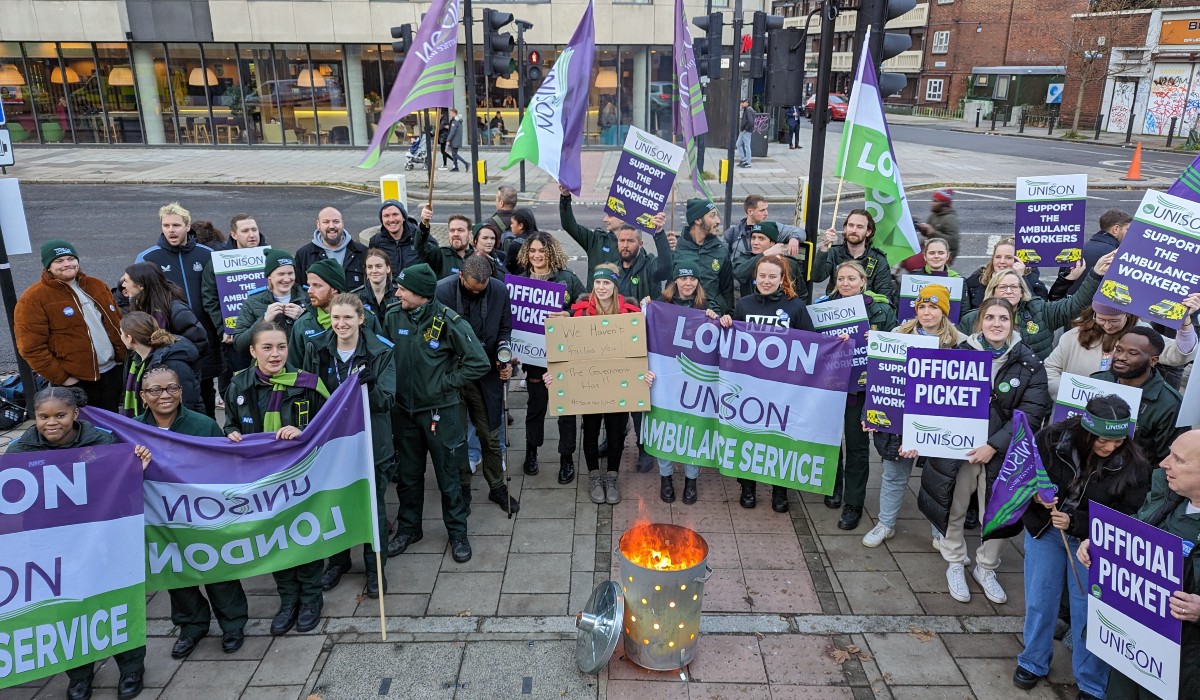 Unison ambulance strike. Photo: Lewis Baker
Unison ambulance strike. Photo: Lewis Baker
The government has ignited a class war, we must build solidarity across the movement and prepare for the battles ahead
Last year, 2022, saw huge parts of the British labour force standing up against more than a decade of pay cuts, declining conditions and the destruction of the public sector. The government, having lost its propaganda battle against the strikes, has now declared an all-out war on workers.
The massive media campaign to demonise strikers has failed. Public support remains strong. Rail workers are still backed by almost half the country, and nurses and ambulance workers have two thirds of the public on their side. In desperation, the government has turned to the full might of the state.
Over the past year, inflation has soared to 14% and real wages are now worth less than in 2008. Public-sector workers, along with the public services they support, are at breaking point. But rather than enter into constructive negotiations, the government has decided to rush through with anti-strike legislation.
The legislation, if passed, will enforce ‘minimum-service levels’ in six of the key public services, including the NHS, schools, the fire service and transport network. Those who withdraw labour as part an industrial dispute and are instructed to work under the minimum-service requirement could be sacked, although how they would be replaced during a recruitment crisis remains unanswered. Unions could be issued with crippling fines, and tougher thresholds for strike ballots could be introduced. Striking will effectively become illegal for millions of workers.
The current strikes are not just about pay. Years of underfunding have resulted in impoverished working conditions, and lack of investment has produced public services unfit for purpose. The UK is a country of stagnant wages and falling productivity, of rising chronic illness, where seeing a doctor is a major feat. It is a country where workers rely on state subsidies to make ends meet, and when they are not met, are forced to resort to charity and food banks. There are now more than 500 people a week dying needlessly because of delays in emergency care, and almost 70% of families are living in poverty.
If this proposed trade-union legislation becomes law, key workers, the very same we clapped on Thursday evenings during the pandemic, will effectively become conscripted workers. They will have no choice but to accept anti-social hours and starvation wages. The public services we all depend on will crumble even further.
This is at a time when corporate profit is at an all-time high, when there is a complete absence of pay restraint at the top, when the discrepancy between the haves and have-nots is growing massively, and when the elites have more than at any time in history.
These same elites accuse workers of demanding ‘unreasonable’ wages, and claim pay increases in the public sector would be ‘inflationary’. This ignores the fact that top City banks, accountancy and law firms have all seen huge pay rises and their staff awarded large bonuses, and that the median annual pay of FTSE 100 CEOs has hit £3.41 million this year: 103 times higher than the median full-time worker’s pay, and up 39% on January 2022. But this is not deemed inflationary, and few call for regulating executive pay.
But as pointed out by the IFS, the Financial Times and others, it is nonsense to say that increasing public-sector pay would lead to an inflationary spiral. The current forty-year high inflation has not been driven by wages, which have been stagnant for over a decade, but by company profiteering, supply issues and war. Analysis by Unite the Union shows the largest companies in the UK increased their profit margins by 73% between 2019 and 2021.
Attacks on workers are not based on sound economic policy, but are aimed at weakening working people, ensuring they know their place, so business can maximise profit and the size of the state be reduced. The government has ignited a class war.
What is astonishing is how little the Labour Party has to offer in defence of labour. It has refused to support the strikes, undermined key workers, as witnessed by recent gibes at GPs, and encouraged privatisation. In a bid to emphasise where the party stands, Starmer, and shadow chancellor Rachel Reeves, are jetting off to the Swiss ski resort of Davos to schmooze with the global elite and pitch themselves as the party of business.
Open warfare has been declared against working people, but no wealth can be created and no economy revived without these very workers. The rank and file of the trade unions, the social campaigns and the radical left must unite and build a strong opposition so we can defeat the Tories. The People’s Assembly conference on 14 January and Stop the War’s trade-union conference on 21 January provide us with the perfect opportunity to build solidarity across the movement and prepare us for the battles ahead. Together we can win.
From this month’s Counterfire freesheet
Before you go
The ongoing genocide in Gaza, Starmer’s austerity and the danger of a resurgent far right demonstrate the urgent need for socialist organisation and ideas. Counterfire has been central to the Palestine revolt and we are committed to building mass, united movements of resistance. Become a member today and join the fightback.

